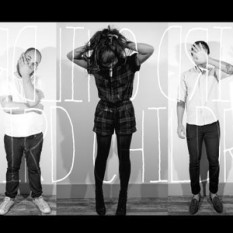Cafeteria
The White Woods LP
Cafeteria’s debut LP, The White Woods, draws on the harmonies of the 1960s Bee Gees, the rock and roll of the early Beatles, and the raw discontent of the Velvet Underground. It may be the most refreshing album of the year, exploring common human experiences without the triteness that normally accompanies such an endeavor.
Cafeteria is Kelly McCobb’s one man band. The White Woods marks McCobb’s reentry into music after the breakup of MX2, which McCobb formed with Aaron Guzikowski (Torture Chamber, The Pants), Dave Hunter (Every Mother’s Son, Third Degree, The Pants) and Robert Mustachio (The Warlocks) in 2004. Describing his impetus to record, McCobb says he became “fascinated with how the potential and promise of youth turns into the kinetic realities of adulthood and responsibility. You get to a point in your life where potential doesn’t mean a damn thing, you are left with who you are, not who you are going to be and that’s what I started writing about.”
This contemporary coming of age crisis is smartly depicted in songs evincing the twang (supremely adept percussion) and desolation (sparse, bass-driven strums) of an old Western. The White Woods, however, is narrated by a man battered by life’s frailties and imperfections, not a John Wayne. “Rome” (All roads lead to Rome / take it as it goes...I’ve given everything I can / I know I don’t understand / I leave until it’s gone / I will never know) represents the nihilistic acceptance of the lack of any such redemptive external source. In “Don’t Tell Me When The Train Comes”, unfulfilled longing of what should make us happy (don’t want to bend / don’t want to be in love) demands desperate, cowardly escape (tie me to the tracks / don’t tell me when the train comes).
McCobb also delivers warped 1950s crooner ballads in “Loyal Laura” and “I’ll Never Get to See You Again”, a beautifully composed homage to lost love (my love / you start / my heart / my heart / my angel / my breath / my sweat). The self-obsessed traumas of youth (I locked myself inside fortified walls / to hide from kids who used their claws) are replaced by the pain that comes from caring for others (Tell me you’ll be alright please / I’ve seemed to lost my faith) and attempts to help them (All you have to do / is make this prison some kind of friend).
Despite the songs’ expressive melodies and lugubrious flair, the album comes off like a well-informed shrug rather than weepy. It concedes the struggle and shares it in a most pleasant way.
Jelena Darling
July 2011 .
Вы можете найти информацию через лучшую поисковую систему по музыке - Muzlan.top 😊Все материалы по запросу "Cafeteria" доступны на странице Cafeteria
Да, конечно. Вы можете послушать треки на странице Cafeteria
Да, конечно. Вы можете скачать треки на странице Cafeteria
Эту страницу находят по запросам: Cafeteria song listen, Cafeteria songs download, Cafeteria mp3 download, Cafeteria track minus, Cafeteria song download

